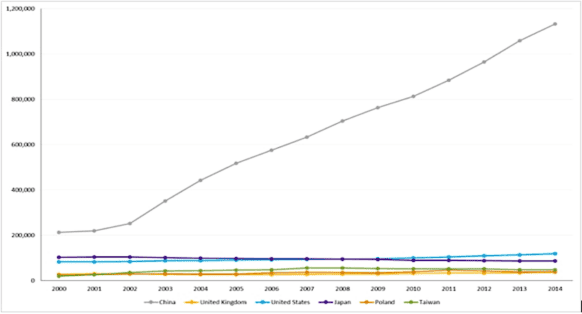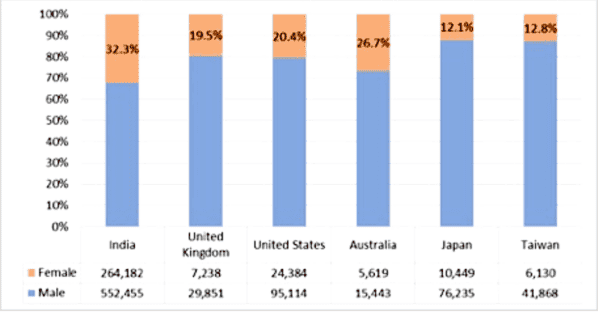By Ursula Nguyen, SWE Research Intern
SWE has updated international statistics posted on its Research site, including new data on engineers in China. The data indicate that there is a stark difference between the United States and China in the number of engineering degrees awarded. In 2014, the United States awarded about 120,000 bachelor’s degrees in engineering while China awarded over 1 million (referred to as first university engineering degrees in China). China even surpassed India, the second leading country who awarded close to 816,000 first university degrees in engineering. A similar trend is also observed in the number of awarded doctoral degrees in engineering. For instance, in 2014, China awarded over 18,000 engineering doctoral degrees compared to approximately 11,300 in the U.S.
First University Degrees in Engineering of Selected Countries, 2014

China’s steady growth in awarding engineering degrees since 2002 has led to a widening gap between China and the rest of the global leaders. This gap, which seems not to be narrowing anytime soon, may be due to the country’s “Made in China 2025” proposal. Under this proposal, China intends to increase its foothold in various technology sectors, including robotics, aerospace, and clean-energy vehicles. In order to increase its focus on innovation, it makes sense that the country is producing a high number of engineers. Yet, recent newshas found China downplaying its “Made in China 2025” message in response to the Trump administration’s attempt to impose tariffs on Chinese imports.
Trends in First University Degrees in Engineering of Selected Countries, 2000-2014

According to the Chinese Statistical Yearbook (2015), women are reported to make up about 52.2% of China’s university and junior college graduates. Although China has the highest number of engineering degree holders, information on the percentage of women among these graduates is not published in the Chinese Statistical Yearbook. Among countries that do provide information on the gender breakdown of engineering graduates, India has the highest percentage of first university engineering degrees awarded to women: 32% of first university degree holders in engineering in India are women. In comparison, about 20% of engineering bachelor’s degrees are awarded to women in the United States. Though we do not have the data to confirm, it would not be surprising to find a similar gender gap in China given that Chinese women also face gender discrimination in the engineering workforce as we previously reported. [We could link to SWE efforts to increase this number of women engineering graduates, if available]
First Engineering University Degree for Selected Countries, by Gender, 2014

Additional global statistics on women in engineering are now available on the SWE Research website.
Author
-

SWE Blog provides up-to-date information and news about the Society and how our members are making a difference every day. You’ll find stories about SWE members, engineering, technology, and other STEM-related topics.






